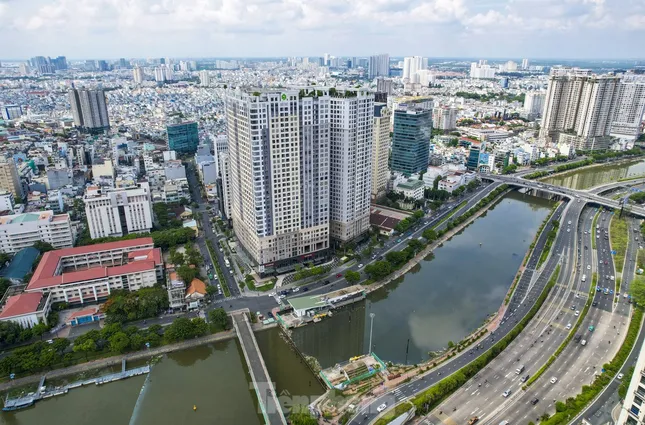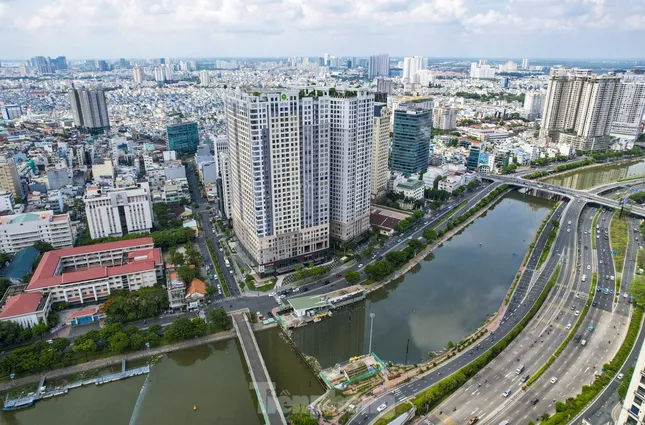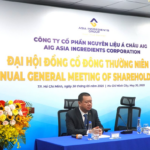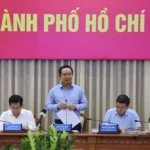In a recent conference on Resolution 201/2025, which focuses on piloting special mechanisms and policies for social housing development, Mr. Nguyen Van Duoc, Chairman of the People’s Committee of Ho Chi Minh City, announced a potential shift in construction permit requirements.
Mr. Duoc stated that in areas with clear urban planning, defined alleyway boundaries, and specific architectural regulations as outlined in the city’s architectural management regulations, residents will no longer need to obtain construction permits. Instead, they will only have to go through a registration process.
The People’s Committee of Ho Chi Minh City has tasked the Department of Construction with providing detailed guidance and implementing this policy by June, aiming to simplify procedures and reduce processing time while maintaining urban management standards.
This initiative aligns with Prime Minister Pham Minh Chinh’s directives to streamline and simplify administrative procedures in the construction sector. The Prime Minister has issued Official Dispatch No. 78/CD-TTg, emphasizing the urgency of cutting down and simplifying administrative procedures related to construction activities.
In response, the Minister of Construction has been instructed to review and simplify 361 administrative procedures and 447 business conditions under the ministry’s jurisdiction. The goal is to reduce processing time, compliance costs, and business conditions by at least 30% in 2025, with a particular focus on construction-related procedures.
One of the key measures is to eliminate the requirement for construction permits for projects within detailed 1/500 scale planning or approved urban design areas. Additionally, there will be a reduction in the number of projects requiring project and design appraisal by specialized construction agencies.

Areas with clear urban planning, defined alleyway boundaries, and specific architectural regulations will no longer require construction permits. Photo: Duy Anh.
The ministry is also tasked with reviewing and supplementing necessary technical standards and norms in the construction sector, particularly in urban planning, to facilitate investment and construction activities. Outdated standards and norms that hinder efficient construction practices will be revoked or amended.
Another significant change is the proposed shift in managing the construction capacity of enterprises. Instead of issuing certificates of competence, enterprises will self-declare their qualifications, and the relevant authorities will conduct post-checks. This move will reduce business conditions in the construction sector.
The Minister of Construction is also instructed to further delegate the authority to approve project and design appraisals, issue construction permits, and inspect acceptance processes to local authorities, aligning with the two-tier administrative model.
Additionally, there is a push to digitize and automate processes (BIM, GIS, IoT, etc.) and reuse data (planning, land, construction activities, population, businesses, etc.) to streamline construction-related administrative procedures, reducing paperwork and processing time.
The Minister of Construction is accountable for the outcomes of these reforms and is responsible for reporting the progress to the Prime Minister monthly.
Local authorities are instructed to ensure the smooth implementation of delegated administrative procedures and to proactively integrate relevant procedures related to investment and construction activities to reduce processing time and costs for citizens and businesses.
Furthermore, local authorities are tasked with closely monitoring and inspecting compliance with construction investment laws by all participants in the construction sector, ensuring effective urban management and social order as the country transitions from pre-checks to post-checks and delegates more authority to lower levels of government.
AIG Unveils Ambitious Plans: 20% Stock Bonus, 5% ESOP Issuance, and an Imminent Move to HOSE
At the 2025 Annual General Meeting, AIG Corporation (UPCoM: AIG) approved a 20% stock dividend and a 5% ESOP issuance. The company is considering an early move to the HOSE, despite only recently listing on the UPCoM in late 2024.
The Inept Bureaucracy: A Tale of Mismanaged Funds and a Mayor’s Shame
“The embarrassment of Ho Chi Minh City’s slow public investment disbursement rate was highlighted by Chairman of the People’s Committee of Ho Chi Minh City, Nguyen Van Duoc. He expressed his shame over the city being reprimanded by the government for three to four consecutive months due to its poor performance in this regard.”
The Ultimate Urban Oasis: Why Top Developers are Betting Big on Hanoi’s “Island”
The island projects share a key feature: well-planned and integrated transportation infrastructure. This strategic development facilitates seamless connectivity to the heart of the city, offering residents and visitors alike convenient access to all that the urban center has to offer.
What’s Inside the Sky Retreat – The Unique ‘Among the Clouds’ Twin Towers at Eco Retreat?
“Sky Retreat is an innovative concept that seamlessly blends two beloved real estate genres: high-rise living and vibrant commercial spaces. This unique development at Eco Retreat presents a harmonious interplay of residential and retail, creating a compelling and attractive proposition for those seeking a dynamic yet tranquil lifestyle.”





















